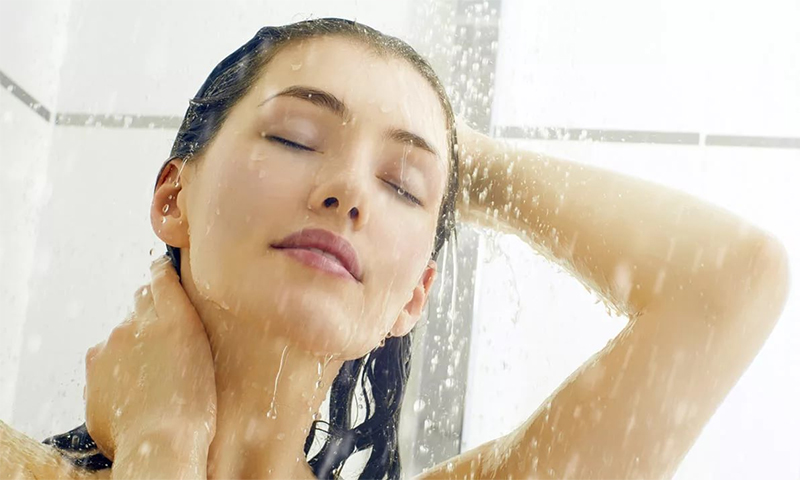A good bath delivers not only a lot of pleasure, but also has a positive effect on health. Light, hot steam - the result of well-built stove. Stones in the steam room are able to accumulate heat and give it away slowly. Properly selected rocks, when interacting with water, will fill the room with useful trace elements, an amazing aroma, helping to prevent various diseases. To achieve a similar effect can only know the characteristics of minerals, their ability to heat. They must have a certain strength, high heat capacity, meet the requirements of environmental safety and emphasize the aesthetic component of the room itself. It is important to be able to understand the healing properties of a particular stone to maximize the effectiveness of bath procedures.

Content:
Types of bath stones
In nature, there are a huge number of rocks, but only a few are suitable for use in the bath. When choosing a stone, it is important to carefully study the characteristics of each mineral. All of them have certain advantages and disadvantages that must be considered in order not to be mistaken and get the expected result.
Jade
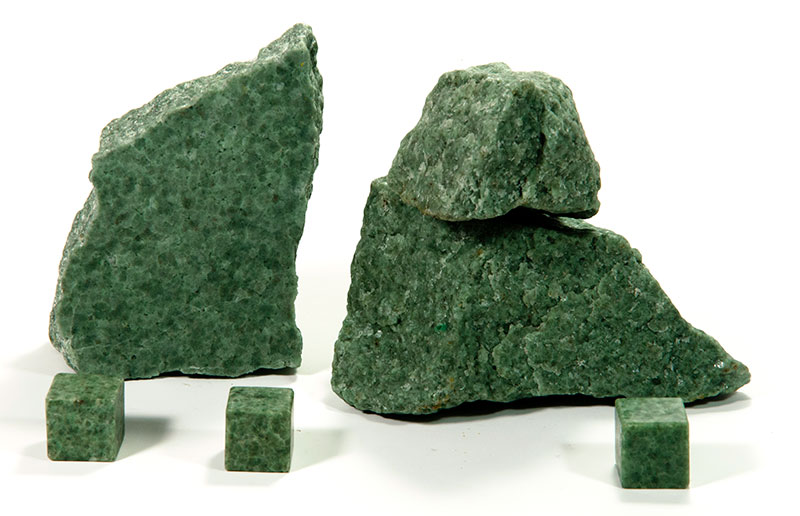
It is considered one of the best for the bath. It is a semi-precious mineral of greenish color.
Pros:
- High density, allowing you to tolerate sudden changes in temperature.
- Strength. Jade does not crumble or crack.
- Long service life.
- Low moisture absorption.
- Able to keep warm for a long time.
- Steam formed by reaction with water, positively affects all organs and systems, improving blood structure, normalizing pressure, reducing rheumatic discomfort. Useful for diseases of the spine.
Minuses:
- Too high price. Therefore, jadeite is usually placed in the last row on top of cheaper rocks.
- At home, it is desirable to use in a prick.
Talkohlorit
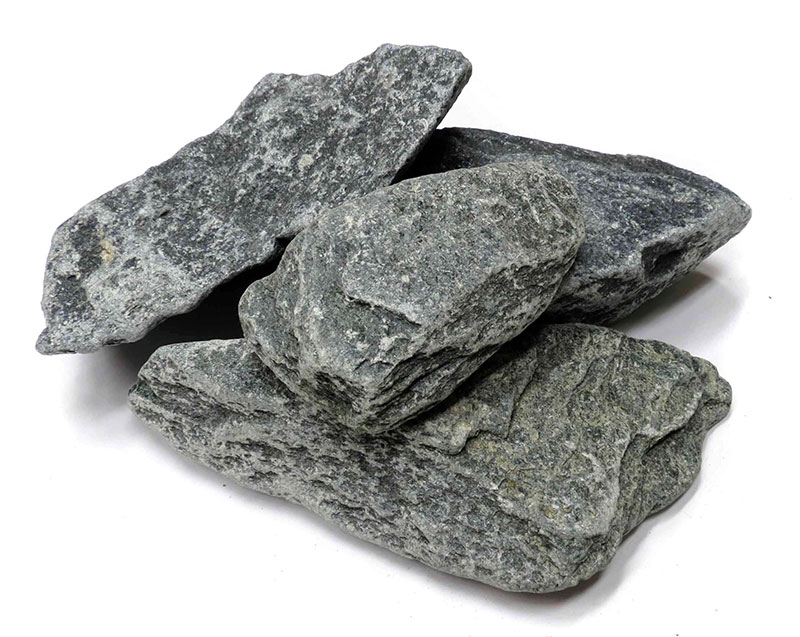
Thermally resistant mineral, easily treatable. It has an absolutely smooth structure and gray color of different shades with a muted matte sheen.
Pros:
- The high content of nutrients released during heating and have a healing effect on the human body. Beneficial effect on the immune system, metabolic processes, normalizes blood pressure.
- The heat radiation is very soft, making the vapor emitted pleasant and airy.
Chemical neutrality - Uniform and long-term heat release, during which no harmful impurities are emitted.
- Resistance to temperature changes.
Minuses:
- High price.
- Pretty big weight.
- Long process of warming up.
Gabbro diabase
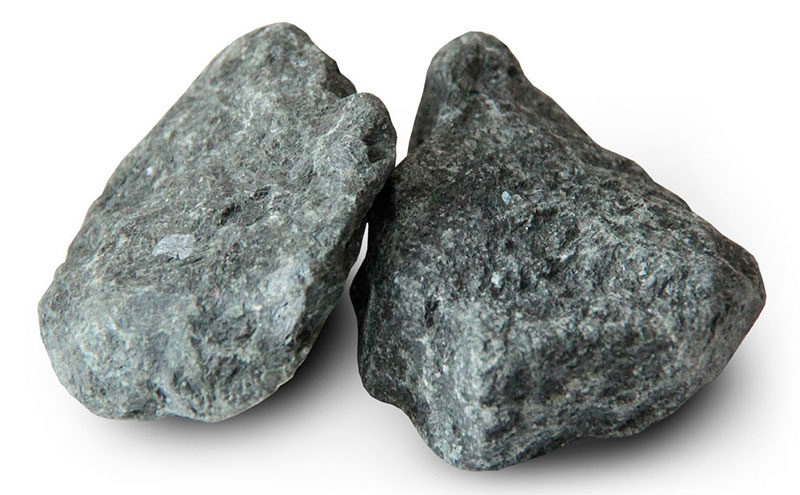
Intermediate between gabbro and diabase rocks. The structure is medium-grained, massive, with the absence of cavities and homogeneity. Dark gray stones have an oval, slightly flattened shape.
Pros:
- Good warm up.
- Ecological purity, the absence of harmful components.
- Low water absorption.
- Affordable price.
- It has a therapeutic effect on the respiratory system, is useful for asthmatics.
Minuses:
- Slowly accumulates heat.
- It has a tendency to cracking. We have to regularly touch the stones, removing the damaged fractions.
- When heated, it can give off an unpleasant smell.
- After drops of essential oils, carbon deposits form on the surface of the stone.
- When laying gabbro diabase, its ability to expand when heated should be considered.
Porphyrite
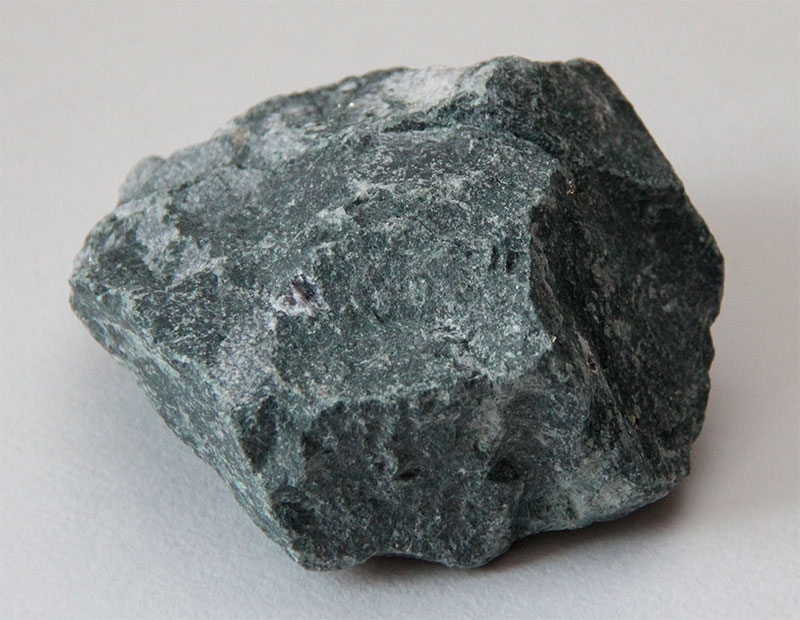
Stone of volcanic origin. May have a green, gray, black color. When cleansing the mineral, before each heating, the steam is more dense.
Pros:
- It has a healing effect on the respiratory system, cleanses the skin, relieves headaches.
- It has a high heat capacity. Maintains temperature.
- Absolutely safe for health.
- It has a long service life, without forming cracks and splits.
Minuses:
- During the first heating, there is a crackling sound, which disappears with time.
- Regular rinsing and cleaning is required.
Crimson Quartzite
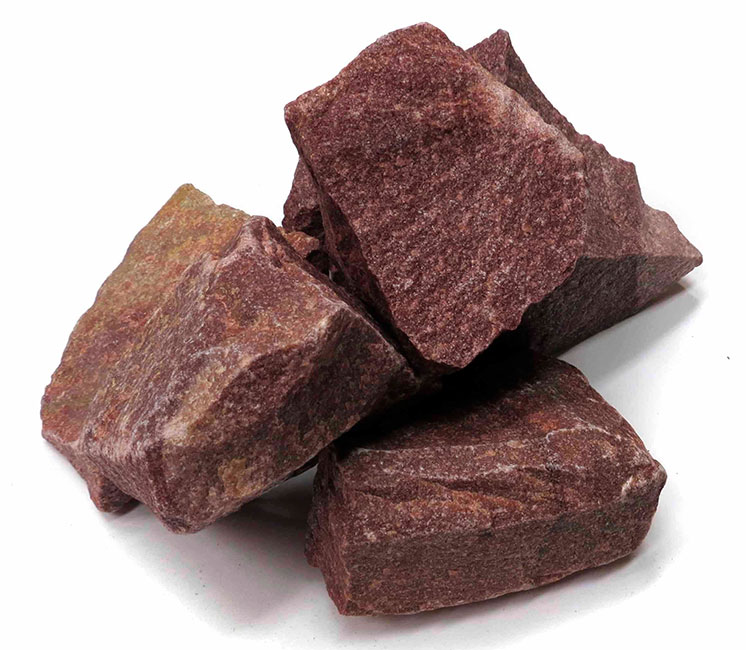
Mineral, able to adorn any steam room due to its rich purple color. Formed during the crystallization of sandstones. Contains up to 90% quartz.
Pros:
- It has healing properties that help to normalize blood pressure, cure colds, rheumatism, muscle aches.
- Fire resistant - withstands heating to 2700 ⁰C.
- At long operation does not lose appearance.
- It has a high density.
- Very durable and wear resistant.
Minuses:
- Due to the high strength of the mineral is difficult to process, so you can only buy in a split form.
- It is not cheap raspberry quartz. Like jadeite, it usually fits in the top row.
Nephritis
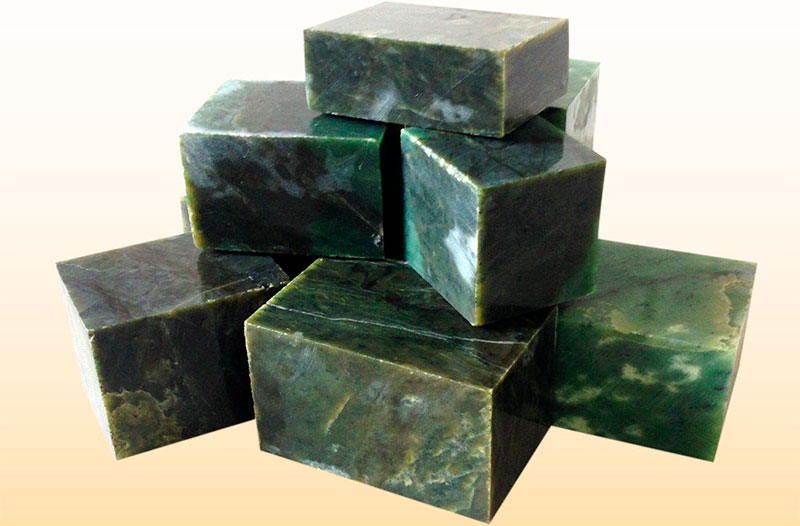
Semi-precious stone of green color, which is a close relative of jadeite.
Pros:
- Due to the high viscosity it retains heat well.
- It has the ability to structure water, positively affect the human biofield.
- Couples formed by the reaction with water, have a therapeutic effect on the respiratory organs, the digestive tract, cleanse the body of toxins and toxins, normalize pressure.
- High degree of strength.
Minuses:
- Mineral is very expensive, so it is practically not found in stores.
- It is impossible to split the stone by hand.
White quartz
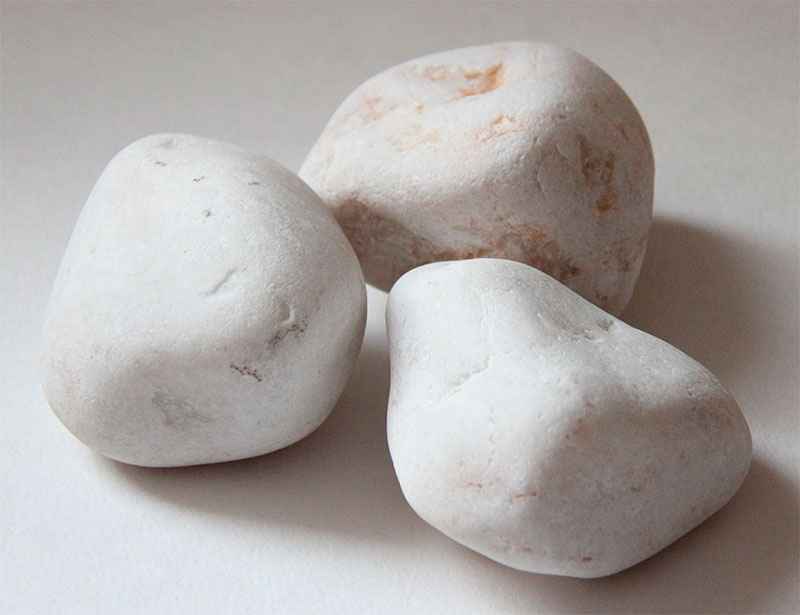
Translucent stone, which consists of oxygen and silicon. With a sharp cooling, after the icy water falling on the hot stove, it releases pure ozone. Among the true lovers of the bath is the most popular mineral.
Pros:
- Quartz has the ability to clear the breath. In this case, the therapeutic effect lasts a few days after the adoption of bath procedures.
- The ozone it produces has a rejuvenating effect on the body.
- Looks in the oven very attractive.
- Environmentally friendly mineral.
Minuses:
- Can burst, not withstanding temperature changes.
- It quickly cracks, as a result of which it is necessary to touch stones often, removing damaged ones.
- Rare and expensive mineral.
Stones for the bath are selected depending on their healing properties, the degree of strength, the planned budget. It is recommended to change the type of stones every 3-4 years, making bath procedures more useful and varied.
Parameters for selecting bath stones
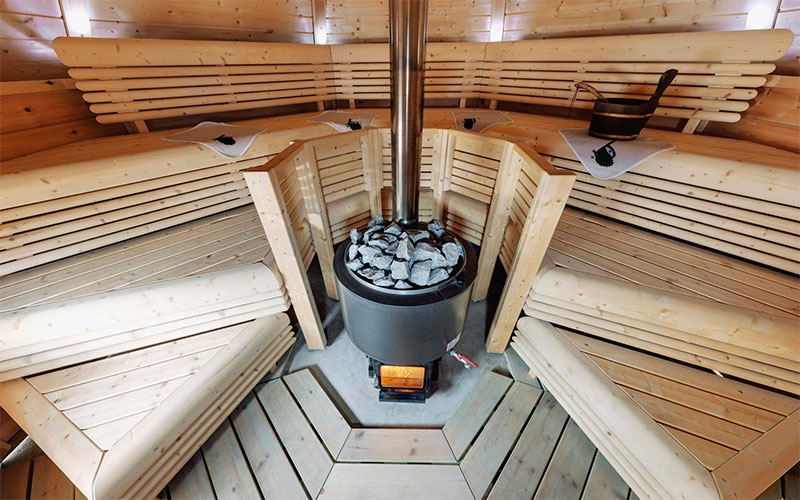
When choosing a breed for a bath, it is important to focus not only on its external attractiveness, but also on meeting certain requirements.
The main parameters when choosing stones for a bath:
1. Strength
Under the influence of temperature, the stone should not crack, crumble. They check the stability by burning the mineral, then dropping it in cold water. You can be convinced of the strength of the stone in the store by knocking one about the other.
2. Ability to keep warm
This is one of the most important properties that bath stones must possess. Checked by specific gravity - the stone must be dense, heavy.
3. Homogeneous structure
Another sign of quality mineral. Various inclusions on the stone indicate the presence of impurities that can be very poisonous. Standing out when heated to the surrounding air, they are capable of causing irreparable harm to health.
4. The form
The shape of the preferred round flat stones. They retain heat better, air circulation is faster. In addition, flat stones fit better in a furnace and have a more aesthetic appearance. Stones pick the same size - large (from 70 to 130 mm in diameter) or small (50-60 mm). How to choose depends on the size of the heater.
5. Environmental friendliness
The most important condition for choosing is ecological cleanliness and safety.For example, stones collected near the railroad tracks are often impregnated with a toxic compound, the vapors of which are heated in air when heated. When purchasing minerals in a store, you need to make sure that there is a mark on the package of the radiation monitoring that has been passed.
As a result of constant heating of the heater, its contents are damaged over time, and the heat release decreases every year by 20%. It is necessary to check the stones annually, washing them with water and replacing those that have become useless with new ones.
What stones for a bath to choose
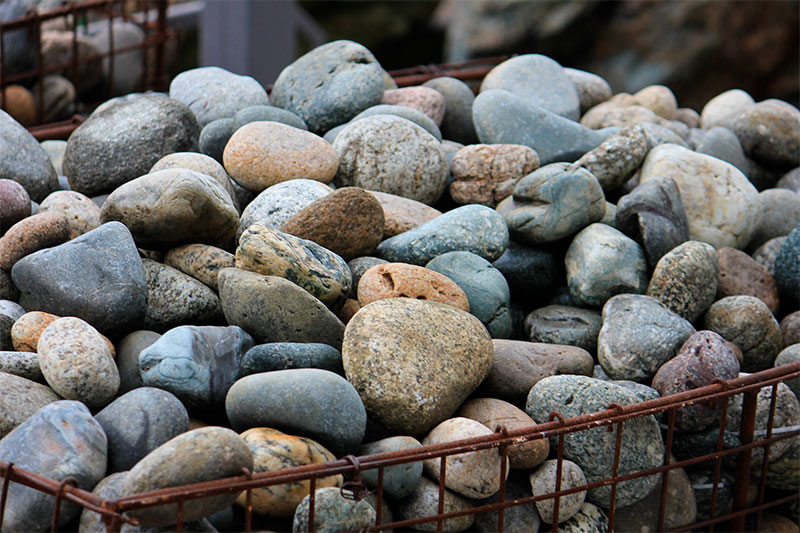
Depending on the bath in which the stove will use the stones, their choice will be determined:
1. Russian sauna
For the Russian bath, where when the water is supplied to the heated heater, there is a sharp temperature difference, the stones should be chosen particularly durable, heat-resistant. Of the rocks the most suitable would be nephrite, jade, pyroxenite. Forming at a depth of many kilometers under high pressure, they have the necessary strength. Boulders that survived the passage of the glacier will also be suitable. Useful stones for a bath are those that give light, fine steam, retain heat well, do not emit harmful substances and do not create dust.
2. Sauna
In the sauna, the test, falling to the share of stones, less severe. Almost all breeds that are suitable for a Russian bath can be used. However, talcochlorite is most preferred.
3. Turkish sauna
The peculiarity of the Turkish bath is that it is the coldest of all types of baths. Kamenka is missing here. To create steam use steam generators. Therefore, the main use of stone - as a finishing material. Marble is best for this purpose.
The stone is selected in the bath, taking into account what kind of stove has:
1. Closed
It is a chamber located inside the furnace. Although not in direct contact with the flame, it is very hot due to the fire outside and furnace gases. As a result, the stones in it are subject to destruction. Therefore, you need to use only those that have high strength. The longest jade is able to survive, thanks to a fibrous, tangled structure that does not allow crumble.
2. Open
Kamenka, which is freely washed by fire - the most extreme environment for stones. In addition to high temperature, they are affected by oxidative processes. In such conditions any, even the most durable rocks are destroyed. The most economical solution is to use inexpensive stones, regularly turning over and replacing the contents of the heater.
3. Electric ovens
Both in Russian and in the Finnish bath, electric furnaces are successfully used. They are more sensitive to the size of the minerals placed in it than to the rock. The optimum size of stones is no more than 7 cm, and their styling is also different. All natural stones with heat resistance and thermal conductivity necessary for a bath are suitable for electric sauna heaters. The ability to withstand numerous cycles of heating and cooling are distinguished by jadeite, crimson quartzite, talkohlorite, gabbro diabase, and, of course, nephrite.
On the type of furnace depends on the service life of the stone. This indicator is also influenced by impurities, frequency of use, and size matters.
How much are the stones for a bath
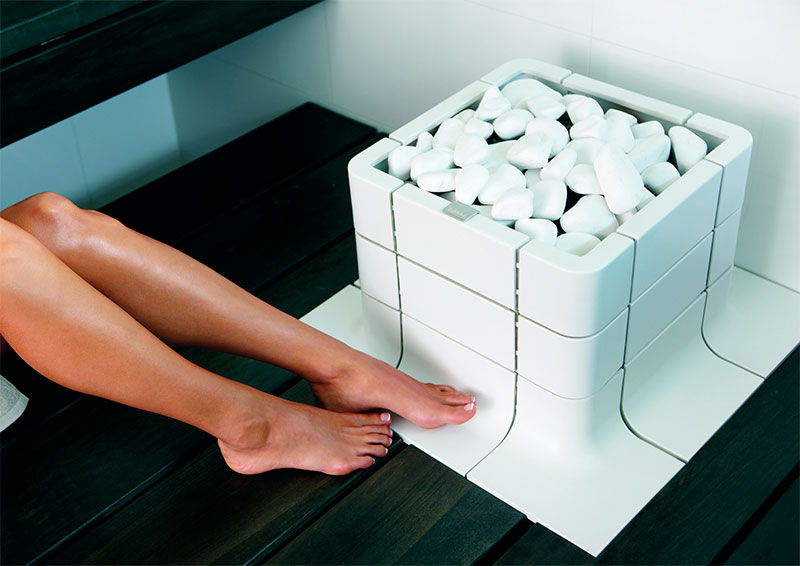
1. Of the stones purchased at the store, the cheapest are gabbro diabase. They are recommended as a budget option, having suitable characteristics for the stove at an affordable price. The reason for the specific odor that spreads from gabbro-diabase when heated is sulphides. You can avoid this trouble if you carefully examine the stones before you buy. The price of gabbro diabase is from 25 to 35 r per kilogram.
2. Jade and jadeite are available to a narrower circle of consumers. The price for 1 kilogram can reach 250 p.
3. There is also a free option - the most common pebbles, which can be collected from the nearest reservoir. It includes various breeds suitable for use in the bath. Pebbles cannot boast of only having a healing effect on the body.
Adhering to certain rules, you can extend the life of stones. To do this, do not pour them abundantly with water, small amounts are enough, but after a shorter period of time. To avoid sudden pops, it is recommended to pour hot water on the stove.
It will be interesting to friends too





